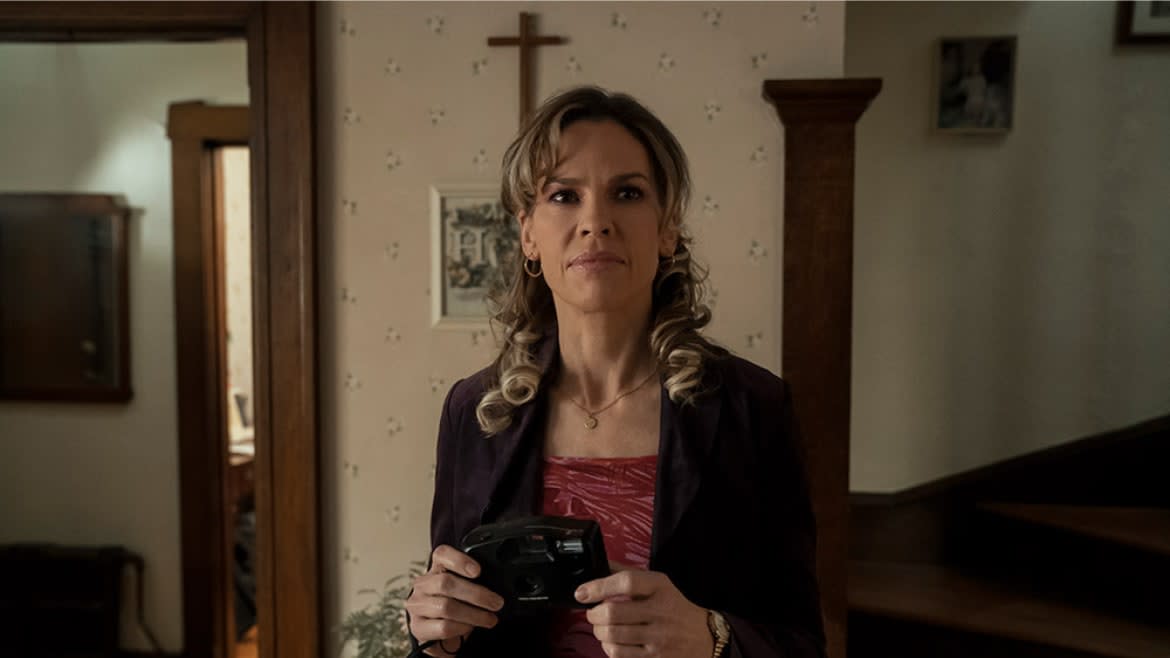‘Ordinary Angels’: Hilary Swank Made a Faith-Based Drama…and It’s Miraculously Good!

- Oops!Something went wrong.Please try again later.
- Oops!Something went wrong.Please try again later.
Much like its characters, Jon Gunn’s Ordinary Angels overcomes seemingly insurmountable odds. Written by actress Meg Tilly (Agnes of God) and filmmaker Kelly Fremon Craig (Are You There God? It's Me, Margaret), the movie evolves, in real time, from a mechanical, saccharine drama by a faith-based studio to a rousing tale of altruism and neighborly good will whose disparate pieces are glued together by a supremely dialed-in cast led by Reacher’s Alan Ritchson.
The premise borrows from a true human-interest story from 1994, when a small town suburb of Louisville, Kentucky came together to help a widowed father save his ailing daughter during a debilitating snowstorm. Plenty of details are altered while others are wholly fictionalized, but Ordinary Angels preserves the core of these real events: the relationship between the Schmitts—grieving roofing contractor Ed (Ritchson) and his adorable young daughters, Michelle (Emily Mitchell) and Ashley (Skywalker Hughes)—and Sharon Stevens (Hilary Swank), the persistent stranger who, in the movie, forces her boisterous-but-loving personality upon them.
An intimate, hospital-set prologue sees Ed celebrating Michelle’s birth with his wife, Theresa (Amy Acker), before a hard cut to a different hospital room, five years later, leaves him a widower. Matching this jarring edit is the one that jumps from night to day as Sharon, then a stranger to Ed’s family, gets drunk, blacks out, and wakes up the next morning. Like Ed, she’s lost time. Ordinary Angels is rarely this impactful or precise again (at least until its climactic scenes), but the editing flourish does the trick: Without a word exchanged, Ed and Sharon feel similarly adrift, bound by a common need to be firmly rooted.
Sharon’s hair salon coworkers urge her to seek help for her drinking problem, but rather than focusing inward, she stumbles upon Ed’s story in a local paper. Michelle, it turns out, is in need of a liver transplant, so Sharon decides to help him raise money for his mounting medical debts, whether he likes it or not.Their dynamic is amusing, but Ed’s reluctance to open himself up to financial assistance, emotional support, or spiritual guidance proves problematic for them both.
Initially, every scene in Ordinary Angels feels factory-designed to relay one specific piece of information at a time, or to mechanically speed through familiar story beats. The writing is unpolished, and that doesn’t always benefit Swank’s brash turn as an ostentatious guardian angel; the Oscar winner is saddled with a whole lot of function-first dialogue that prevents her from skillfully disguising parts of Sharon’s life or tactfully navigating conversations.
But the rest of the performances come to the rescue. Mitchell and Hughes tug at the heartstrings as Ed’s young daughters (aged 5 and 8) without falling victim to the kind of broad, drawn-out delivery often seen from child actors. Gunn does a remarkable job of making their scenes feel natural and playful—not to mention devastating, when their curiosities about death and the afterlife arise. This in turn allows Ritchson to access a vulnerable part of himself, as a father protecting his children’s confusion and innocence in the face of a morbid reality.
Though produced by the faith-based studio Kingdom Story Company and directed by a Pure Flix veteran, Ordinary Angels avoids the trap of preaching to the choir. It nestles its musings on belief within quaint scenes of father-daughter drama without letting them overwhelm the gentle character dynamics. Questions, whether about heaven or Ed’s own faith (or lack thereof in the face of tragedy), could so easily have been given didactic answers. Instead, Ordinary Angels allows its performers to ruminate on mysteries in touching ways.
Hilary Swank Went All the Way to Alaska to Save Network TV
Especially Ritchson. Right from his initial scenes, he’s magnetic in his silence, looking like he could burst into either tears or fits of rage at any moment. Casting a 6-and-a-half-foot tall, Schwarzenegger-like hunk as an everyman can be a risky proposition, but Ritchson has the withheld, barely-concealed desolation of, well, every man. Ed may not admit it, but he’s a guy who deserves a break.
Ordinary Angels turns out to be a tightly controlled and satisfying melodrama. With the help of operatic music, Ritchson’s performance even transforms the movie’s climax—a highwire act of community resilience pitted against a ticking clock—into a series of cheer-out-loud moments. Sharon trying to find purpose outside herself may not be the most thrilling or nuanced direction for the film to take, but it lays the foundation for an excellent crescendo. In the end, simple, straightforward sentimentality saves the day.
Get the Daily Beast's biggest scoops and scandals delivered right to your inbox. Sign up now.
Stay informed and gain unlimited access to the Daily Beast's unmatched reporting. Subscribe now.

